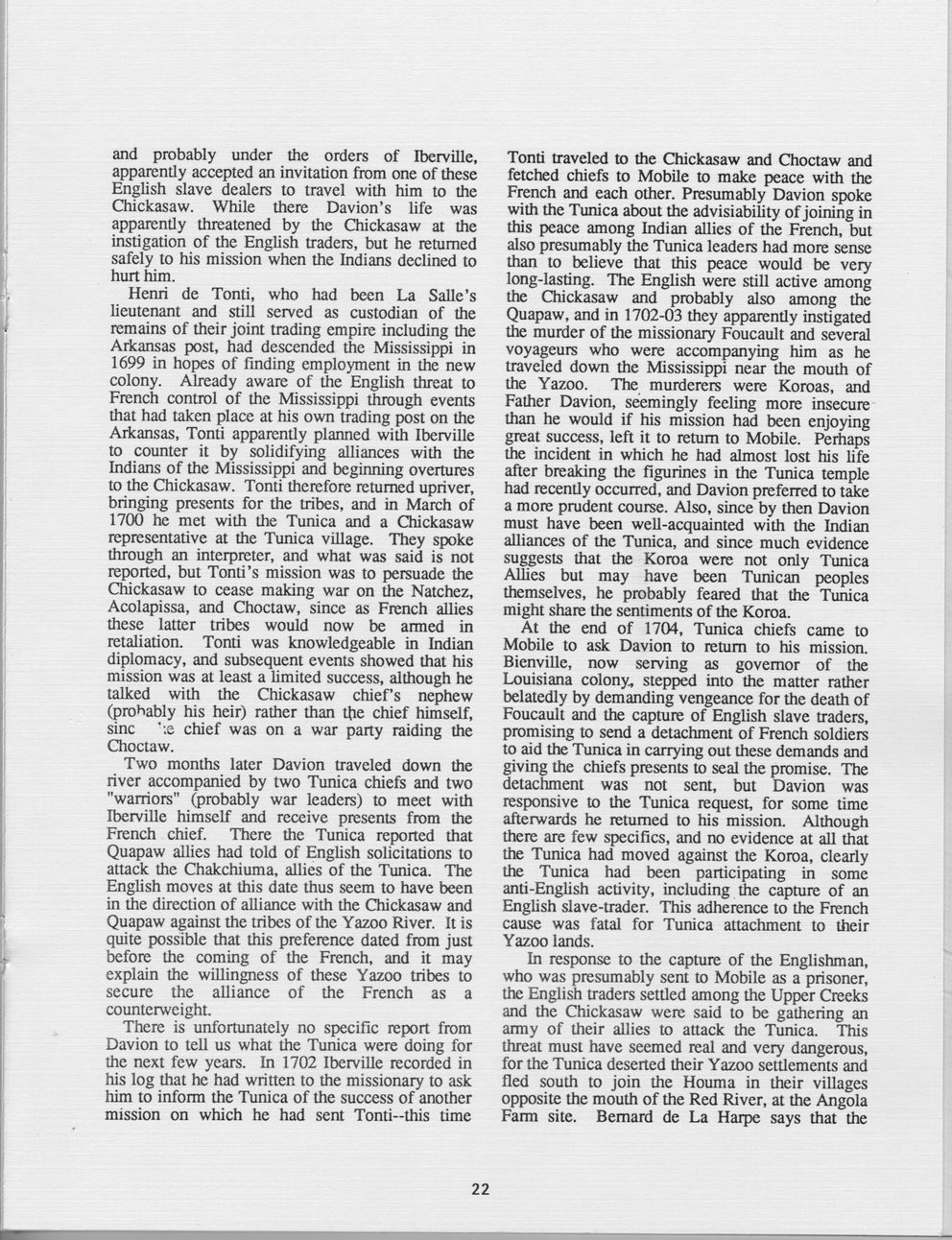This text was obtained via automated optical character recognition.
It has not been edited and may therefore contain several errors.
and probably under the orders of Iberville, apparently accepted an invitation from one of these English slave dealers to travel with him to the Chickasaw. While there Davion’s life was apparently threatened by the Chickasaw at the instigation of the English traders, but he returned safely to his mission when the Indians declined to hurt him. Henri de Tonti, who had been La Salle’s lieutenant and still served as custodian of the remains of their joint trading empire including the Arkansas post, had descended the Mississippi in 1699 in hopes of finding employment in the new colony. Already aware of the English threat to French control of the Mississippi through events that had taken place at his own trading post on the Arkansas, Tonti apparently planned with Iberville to counter it by solidifying alliances with the Indians of the Mississippi and beginning overtures to the Chickasaw. Tonti therefore returned upriver, bringing presents for the tribes, and in March of 1700 he met with the Tunica and a Chickasaw representative at the Tunica village. They spoke through an interpreter, and what was said is not reported, but Tonti’s mission was to persuade the Chickasaw to cease making war on the Natchez, Acolapissa, and Choctaw, since as French allies these latter tribes would now be armed in retaliation. Tonti was knowledgeable in Indian diplomacy, and subsequent events showed that his mission was at least a limited success, although he talked with the Chickasaw chief’s nephew (probably his heir) rather than the chief himself, sine ’■.£ chief was on a war party raiding the Choctaw. Two months later Davion traveled down the river accompanied by two Tunica chiefs and two "warriors" (probably war leaders) to meet with Iberville himself and receive presents from the French chief. There the Tunica reported that Quapaw allies had told of English solicitations to attack the Chakchiuma, allies of the Tunica. The English moves at this date thus seem to have been in the direction of alliance with the Chickasaw and Quapaw against the tribes of the Yazoo River. It is quite possible that this preference dated from just before the coming of the French, and it may explain the willingness of these Yazoo tribes to secure the alliance of the French as a counterweight. There is unfortunately no specific report from Davion to tell us what the Tunica were doing for the next few years. In 1702 Iberville recorded in his log that he had written to the missionary to ask him to inform the Tunica of the success of another mission on which he had sent Tonti—this time Tonti traveled to the Chickasaw and Choctaw and fetched chiefs to Mobile to make peace with the French and each other. Presumably Davion spoke with the Tunica about the advisiability of joining in this peace among Indian allies of the French, but also presumably the Tunica leaders had more sense than to believe that this peace would be very long-lasting. The English were still active among the Chickasaw and probably also among the Quapaw, and in 1702-03 they apparently instigated the murder of the missionary Foucault and several voyageurs who were accompanying him as he traveled down the Mississippi near the mouth of the Yazoo. The murderers were Koroas, and Father Davion, seemingly feeling more insecure than he would if his mission had been enjoying great success, left it to return to Mobile. Perhaps the incident in which he had almost lost his life after breaking the figurines in the Tunica temple had recently occurred, and Davion preferred to take a more prudent course. Also, since by then Davion must have been well-acquainted with the Indian alliances of the Tunica, and since much evidence suggests that the Koroa were not only Tunica Allies but may have been Tunican peoples themselves, he probably feared that the Tunica might share the sentiments of the Koroa. At the end of 1704, Tunica chiefs came to Mobile to ask Davion to return to his mission. Bienville, now serving as governor of the Louisiana colony, stepped into the matter rather belatedly by demanding vengeance for the death of Foucault and the capture of English slave traders, promising to send a detachment of French soldiers to aid the Tunica in carrying out these demands and giving the chiefs presents to seal the promise. The detachment was not sent, but Davion was responsive to the Tunica request, for some time afterwards he returned to his mission. Although there are few specifics, and no evidence at all that the Tunica had moved against the Koroa, clearly the Tunica had been participating in some anti-English activity, including the capture of an English slave-trader. This adherence to the French cause was fatal for Tunica attachment to their Yazoo lands. In response to the capture of the Englishman, who was presumably sent to Mobile as a prisoner, the English traders settled among the Upper Creeks and the Chickasaw were said to be gathering an army of their allies to attack the Tunica. This threat must have seemed real and very dangerous, for the Tunica deserted their Yazoo settlements and fled south to join the Houma in their villages opposite the mouth of the Red River, at the Angola Farm site. Bernard de La Harpe says that the 22

Native Americans The-Tunica-Biloxi-Tribe-its-Culture-and-People-(29)